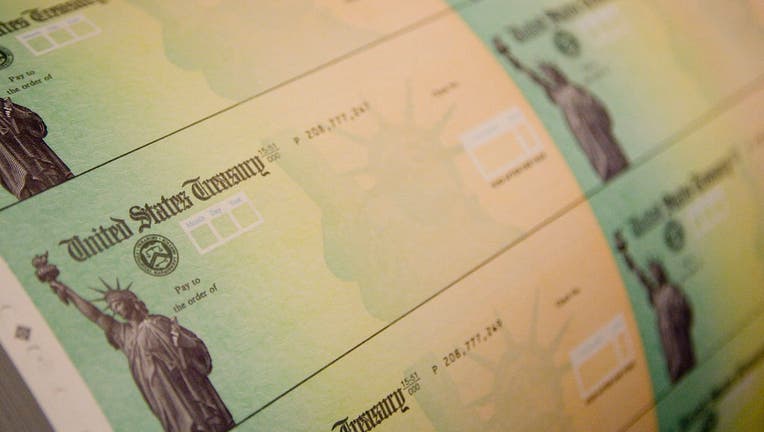Senate signals bipartisan support for more targeted $1,400 stimulus checks

File photo of a government check. (Jeff Fusco/Getty Images)
WASHINGTON - The Senate signaled overwhelming support on Thursday for limiting wealthy Americans from receiving a third stimulus check in the latest coronavirus relief package.
The chamber voted 99-1 on an amendment proposed by Sens. Joe Manchin, D-W.Va., and Susan Collins, R-Maine, barring "upper-income taxpayers" from eligibility for the direct cash payments.
"The question before us is quite simple. Do we want stimulus checks to go to households with family incomes of $300,000?" Collins asked during the Senate's "vote-a-rama" on Thursday. "Or do we want to target the assistance to struggling families who need the help and provide a boost for the economy?"
RELATED: Democrats renew push for 'baby bonds' in bid to narrow wealth gap
While the vote is non-binding, the broad support for the amendment — Sen. Rand Paul, R-Ky., was the only nay vote — suggests that lawmakers are open to lowering the income threshold for the payments, even as Democrats move forward with using their slimmest-possible majority to pass the measure without any Republicans on board.
"I don't think a single person on this floor would disagree to target the relief to our neighbors who are struggling," Manchin said. "There are other families who have not missed a single paycheck as a result of this pandemic. It does not make sense to send a check to those individuals."
While the amendment does not specify levels of eligibility for the checks, it reflects a growing belief among some members of both parties that the payments would be most effective if they were more narrowly distributed to lower-income Americans.
President Biden, who has maintained that that nearly $2 trillion emergency aid package needs to include direct payments worth $1,400, has indicated that he's open to limiting eligibility for the money in hopes of securing some GOP support.
"Further targeting means not the size of the check, it means the income level of people who receive the check," White House press secretary Jen Psaki told reporters during a briefing on Wednesday. "That's something that is under discussion."
MORE NEWS: Biden says US ‘diplomacy is back’ in foreign policy address
One proposal floated by senior Democrats includes lowering the threshold for the payments to begin phasing out above $50,000 for single taxpayers, $75,000 for people who file as the heads of households, and $100,000 for married couples, according to The Washington Post.
If the relief plan followed a formula in House-passed legislation last year, the $1,400 checks would taper off for individuals who earn $75,000 more a year and families making $150,000 or more. But the phaseout level increases for families with more children, meaning that a family with multiple children earning more than $300,000 a year could theoretically receive some money, even if they have not suffered a financial setback during the pandemic.
Sen. Bernie Sanders, I-Vt., said on the Senate floor that no one supported sending money to families earning more than $300,000 a year, but urged his colleagues to keep the threshold level in line with previous relief packages. (Under both the CARES Act and the $900 billion relief package passed in December, Americans earning less than $75,000 received the fully promised payments of $1,200 and $600, respectively).
"I do not oppose this amendment. I do not think anybody here wants to see people who make $300,000 get direct payments," he said. "Let's make certain that people who are making $75,000 per year or less do get their payments and couples making $150,000 or less do get their payments."
MORE NEWS: US gun sales hit record high in January, continuing 2020 surge
New research published by Opportunity Insights, a nonpartisan policy institute based at Harvard University, laid out evidence that the money would be most effective at boosting the U.S. economy if it targeted lower-income Americans.
The economists found that when the government sent out $600 checks as part of the $900 billion relief package Congress approved in December, spending among households making less than $46,000 rose 7.9% from Jan. 6 to Jan. 19 compared to the year-ago period.
By comparison, spending inched up just 0.2% for households making more than $78,000.
"Targeting the next round of stimulus payments toward lower-income households would save substantial resources that could be used to support other programs, with minimal impact on economic activity," the researchers wrote.

